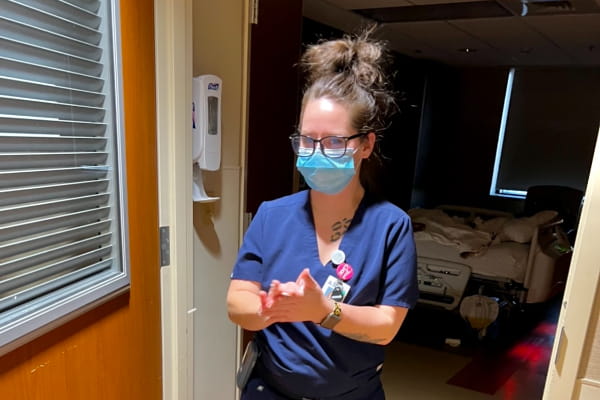Knowing that hospitals were struggling under the weight of COVID-19, she told her director, Mollie Botts, that she was comfortable working in the hospital environment and would like to help.
So when Botts called to ask her if she could work on Sunday, Jan. 9, Parris readily agreed and spent from 7 - 11 p.m. helping on a unit at Ascension Via Christi St. Francis.
The following morning, Parris shared with staff at the outpatient clinic about the need and the training being offered to clinical and non-clinical staff to help prepare them for a variety of assistive roles at the bedside.
That Friday afternoon, Parris was asked if she would take a second four-hour shift. This time, several of the medical assistants also went to St. Francis to participate in training.
Within the next two weeks, approximately half of her 31-member team had undergone training, most of whom had signed up to work one or more shifts.
"A lot of them are helping with the 7 - 11 p.m. block of time, which is where they are most needed," says Parris. "That puts them there for shift change, which helps with that transition."
They also are filling spots on weekends, another time of urgent need, in roles ranging from assisting nurses and nurse aides to patient sitters and transporters.
As of Wednesday, Jan. 26, Parris' team had worked more than 126 hours, the equivalent of more than three 40-hour workweeks.
"I had hoped to set an example," says Parris. "Now they are the ones who are doing that."
A unified response
The number of associates responding to a recent call for bedside assistance continues to grow, providing much-needed support during the Omicron-fueled surge of COVD-19 patients.
A significant amount of that help has come from the outpatient clinics, says Amber Droegemeier, who is helping lead the initiative.
"It's a great example of a unified response to a communitywide issue," says Droegemeier. "We are so much stronger when we work across the continuum of care to meet the needs of patients and families."
Once the appropriate training has been completed, associates simply call the Staffing Office and tell them what they are qualified to do and then show up for their assigned shift.
Parris says that the initiative has been as beneficial to her team as it has been to the hospital staff they're supporting, providing an excellent learning opportunity as they walk in the shoes of their bedside counterparts.
It also has led some to re-engage with educational and career growth plans they had put on hold because of the pandemic and helped re-ignite their passion for their profession.
"Patients in the hospital really need your physical help and that's a lot different than the needs of our patients in the clinic," says medical assistant Jessie Tomlinson, who had no previous hospital experience. "But I absolutely loved it because of the time I got to spend with patients."
"Being there for them was so rewarding," says Tomlinson, who worked her third shift on a St. Francis medical-surgical unit on Friday, Jan. 28. She also enjoyed her interactions with staff on the unit. "I could tell that my help was much appreciated."
Jaime Butler, RN, who worked with Tomlinson on one of those shifts, says that they were happy to help with whatever was needed.
"We just helped wherever we could, doing things that typically a nurse aide would do because they can always use help," she said. "It felt good to help out. I am totally open to doing more and doing whatever is needed."

